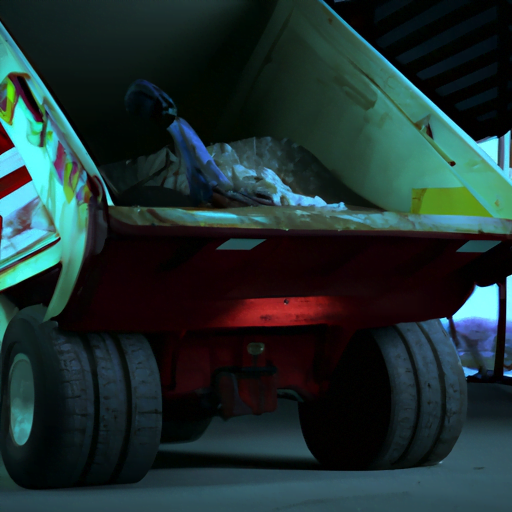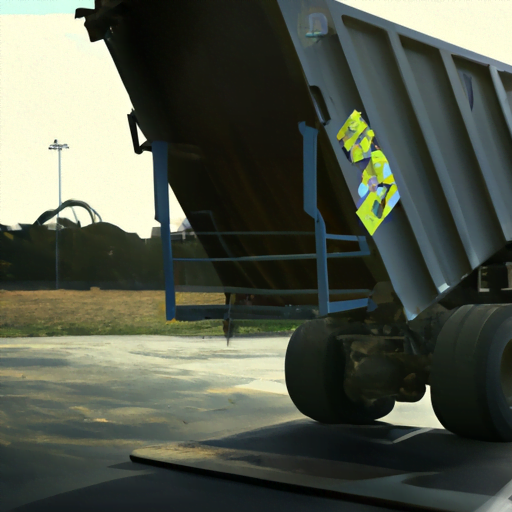-
Table of Contents
How to Safely Operate Your Dump Trailer: A Comprehensive Guide

Operating a dump trailer may seem like a straightforward task, but it’s essential to prioritize safety to prevent accidents and damage to your equipment. In this article, we’ll explore the best practices for safely operating your dump trailer, including tips for loading, unloading, and maintaining your equipment. We’ll also discuss the importance of understanding your trailer’s weight capacity and how to avoid common mistakes that can lead to accidents. So, let’s dive in and learn how to safely operate your dump trailer!
Understanding Your Dump Trailer’s Weight Capacity
One of the most critical aspects of safely operating your dump trailer is understanding its weight capacity. Overloading your trailer can lead to a variety of issues, including equipment damage, decreased fuel efficiency, and even accidents. To avoid these problems, follow these guidelines:
- Consult your trailer’s owner’s manual to determine its maximum weight capacity.
- Always weigh your load before loading it onto the trailer to ensure it’s within the acceptable range.
- Remember that the weight of the trailer itself counts towards the total weight capacity, so factor that in when calculating your load.
- Keep in mind that unevenly distributed weight can also cause issues, so aim to distribute your load evenly across the trailer bed.
Proper Loading Techniques
Now that you understand your dump trailer’s weight capacity, it’s time to learn how to load it properly. Follow these best practices to ensure a safe and efficient loading process:
- Always use the appropriate equipment for loading, such as a skid steer or front-end loader.
- Ensure the trailer is parked on level ground and the brakes are engaged before loading.
- Load the heaviest materials first, placing them in the center of the trailer bed to maintain proper weight distribution.
- Stack lighter materials on top of heavier ones to prevent shifting during transport.
- Secure your load with straps or chains to prevent movement during transit.
Safe Unloading Practices
Once you’ve reached your destination, it’s time to unload your dump trailer. Follow these safety tips to ensure a smooth and accident-free unloading process:
- Before unloading, ensure the trailer is parked on level ground and the brakes are engaged.
- Double-check that there are no overhead obstacles, such as power lines or tree branches, that could interfere with the dumping process.
- Stand clear of the trailer and use the remote control or manual lever to activate the dumping mechanism.
- Monitor the unloading process closely and be prepared to stop the dump trailer if any issues arise.
- Once the load has been fully dumped, lower the trailer bed and disengage the dumping mechanism before driving away.
Maintaining Your Dump Trailer
Regular maintenance is crucial for ensuring the safe operation of your dump trailer. By keeping your equipment in good working order, you can prevent accidents and extend the life of your trailer. Here are some essential maintenance tasks to perform regularly:
- Inspect your trailer’s tires for proper inflation, tread depth, and signs of damage. Replace any worn or damaged tires as needed.
- Check your trailer’s brakes and ensure they are functioning correctly. Have them serviced or replaced if necessary.
- Examine your trailer’s hydraulic system for leaks or damage. Repair or replace any damaged components as needed.
- Regularly lubricate all moving parts, such as hinges and latches, to prevent rust and ensure smooth operation.
- Inspect your trailer’s electrical system, including lights and wiring, for any signs of damage or wear. Repair or replace any damaged components as needed.
Avoiding Common Mistakes
Even experienced dump trailer operators can make mistakes that lead to accidents or equipment damage. By being aware of these common errors, you can take steps to avoid them and ensure a safer operation:
- Overloading your trailer, as discussed earlier, can lead to a variety of issues. Always stay within your trailer’s weight capacity and distribute your load evenly.
- Attempting to dump your load on uneven or unstable ground can cause your trailer to tip over. Always ensure the ground is level and stable before unloading.
- Forgetting to engage the brakes before loading or unloading can result in your trailer rolling away or tipping over. Always engage the brakes before performing these tasks.
- Ignoring maintenance tasks can lead to equipment failure and accidents. Regularly inspect and maintain your dump trailer to keep it in good working order.
Conclusion
Safely operating your dump trailer is essential for preventing accidents and ensuring the longevity of your equipment. By understanding your trailer’s weight capacity, following proper loading and unloading techniques, maintaining your equipment, and avoiding common mistakes, you can ensure a safe and efficient operation. Remember, safety should always be your top priority when operating any heavy equipment, including dump trailers. Happy hauling!

